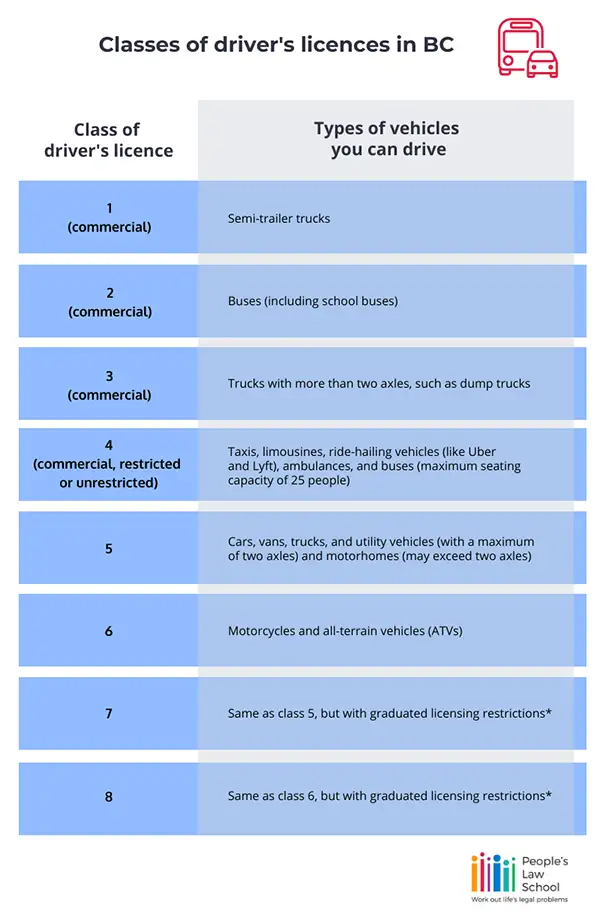
It takes a while to get your driver's licence. But once you get it you can never lose it.
Getting a driver’s licence for the first time is exciting. Before you can get behind the wheel in BC, though, you need to learn the rules of the road. Once you’ve earned your licence, you can keep it as long as you follow those rules and drive safely. Learn what you need to do to get — and keep — your licence.
What you should know
“I’m 28 years old and just got my driver’s licence. It’s been a long road. I got a couple of tickets and a driving prohibition while I was a new driver. So instead of being able to get my licence in three years, it took me five because I had to restart the time for my N. I’m a better and more careful driver now."
– Danny, Vernon, BC

First-time drivers — as young as 16 years of age — used to be able to get their driver’s licences within six months to a year. One written test and one road test was all it took.
This changed in 1998, when BC introduced the graduated licensing program. Now a first-time driver who’s at least 16 years old faces a much more stringent and lengthy process. There are three levels of driving apprenticeship — from learner to novice to fully licensed driver. If you follow the rules of the program and drive safely, you can have your full driver’s licence in about three years from start to end.
You can apply for a learner’s licence any time after you turn 16. (If you’re under 19, though, you’ll need a parent or legal guardian to sign the application.) You must learn BC’s driving rules. Then you make an appointment at an ICBC driver licensing office, pay a fee, and take a knowledge and vision test to get your L.
Now you can drive. But only with a “supervisor” who’s at least 25 and has a valid licence. To keep your L, you also:
can only have one passenger in the vehicle (aside from your supervisor),
must display an L sign on the back of your vehicle,
can’t have any alcohol or drugs in your system when you drive,
can’t use any electronic devices at all while driving, and
can’t drive between midnight and 5 am.
Your L licence is good for two years. But after driving as a L driver for at least one year, you can pay a fee and book your first road test with an examiner at an ICBC driver licensing office. If you pass, you’ll get your novice licence, or your N. (If you don’t pass, you can take the test again after 14 days.)
As with your learner’s licence, there are some rules. To keep your N, you:
must have an N sign on the back of your vehicle,
can drive by yourself, or with one passenger who’s outside your immediate family (to drive with more passengers, one of them must be a “supervisor” who’s at least 25 years old and has a valid licence),
can’t have any alcohol or drugs in your blood when you drive, and
can’t use any electronic devices while you drive.
You can apply for your full licence after having your N for at least two years of safe driving. One exception: you can apply after 18 months if you took an ICBC-approved driver training course while you had your L and were a safe driver.
You can book an appointment at an ICBC driver licensing office to take your final road test. You’ll need to take your identification and pay a fee. If you pass the road test, you’ll get your full licence. (If you don’t pass, you can take the test again after 14 days.)
To keep your licence, you need to:
follow the rules of the road (including not driving while impaired by alcohol or drugs, not using an electronic device while driving, not speeding, and so on),
follow any restrictions on your driver’s licence (for example, wearing glasses when driving), and
take any medical tests and further road tests as required by the Superintendent of Motor Vehicles.
You must have your driver’s licence with you when you’re driving. If you can’t produce it on demand to an officer who’s pulled you over, you’ll be fined.
Also, your licence doesn’t last forever; you’ll have to renew it before the expiry date (usually every five years). It’s illegal to drive with an expired licence.
Support for new drivers
You’ll find practice tests, tips, and other driving resources on ICBC’s website. They also have information about booking an appointment for tests, fees, and finding an ICBC driver licensing office.
“I recently moved to BC from Australia. I’ve had to make a lot of changes — like driving on the right side of the road! I have to get a BC driver’s licence, but I can keep driving with the one I have for up to three months. The good news is I can just exchange my Australian driver’s licence for a BC one. I don’t have to take any tests."
– Olivia, Whistler, BC

If you’ve just moved to BC from another province or country and have a valid driver’s licence, you must:
register, license, and insure your vehicle within 30 days of arriving in BC, and
apply for a BC driver’s licence within 90 days (there are some exceptions to this 90-day rule); in the meantime, you can continue to use the driver’s licence you have.
(If you've previously held a BC driver's licence and are returning to the province, you won’t be considered a new resident.)
Applying for a BC driver's licence
To apply for a driver’s licence in BC, you need to book an appointment at an ICBC driver licensing office. You’ll need to bring your identification and pay an application fee. You must also:
have held a full driver’s licence for at least two years, and
provide proof of your driving experience, including your current driver’s licence or an original document that shows your driver’s licence history.
If you haven’t held a driver’s licence for at least two years or can't prove it, you’ll have to enroll in BC’s graduated licensing program. You’ll start with an N licence.
Exchanging your licence
Depending on where your driver’s licence is from, you may be able to exchange your driver’s licence for one from BC without having to take a knowledge and road test. ICBC’s website has a list of countries that BC has a licence exchange agreement with.
There isn’t just one type of driver’s licence for all vehicles. In BC, there are several different classes of driver’s licences. Which one you apply for depends on the kind of vehicle you want to drive — a car, motorcycle, or a commercial vehicle (like a taxi or a bus), for example. Having said that, the most common type of licence is the Class 5 vehicle licence for driving cars, vans, or trucks.

*Class 7 graduated licensing restrictions / *Class 8 graduated licensing restrictions
It can take years to earn your driver’s licence, but an instant to lose it. If you’re caught impaired driving, for example, your licence is suspended for 90 days. You have to surrender it right away.
Driver penalty points
In other cases, you could lose your licence because of one or more driving violation tickets. Driving violation tickets (but not parking tickets) get you driver penalty points. These are like black marks on your driving record. Generally, the more points on your record, the more at risk you are of losing your licence (not to mention the fines and penalties you also have to pay). But there isn’t a strict rule about how many points or tickets will cause you to lose your licence. It could happen for any number of reasons, including:
one serious driving offence (for example, stunt driving or street racing)
two high-risk driving offences (for example, distracted driving, excessive speeding, or driving without due care) within a 12-month period
a poor driving record due to an accumulation of driving violation tickets
It’s even more serious if you're an L or N driver. If you’re an L driver, you could lose your licence if you get any driving violation tickets. The same may be true if you’re an N driver. Typically, though, you can lose your licence as an N driver for up to six months with a ticket that carries between two and six penalty points. If you get a driving prohibition, you have to restart the two-year driving period for an N licence.
Other reasons
On the other hand, you might have had your licence for years. But you’ll have to give it up if you don’t pass a driver medical exam or road re-test (we explain these in a moment).
You could also lose your licence for reasons unrelated to your driving record. For example, if you owe more than $3,000 in child support payments to your child’s other parent, ICBC can cancel your licence or refuse to give you a new one. (Legal Aid BC describes the steps you can take to deal with this situation.)
While you have the right to apply for a licence, keeping it is a privilege.
As you grow older, age-related health changes may affect your ability to drive safely. That’s why at age 80, and every two years after that, you must have a driver medical examination. RoadSafetyBC may also refer you for a driving re-test called an enhanced road assessment. These tests help determine your medical fitness to continue driving.
You may have to have a driver medical exam before turning 80 in certain situations, including if:
you're applying for a commercial licence
you have an ongoing medical condition
a medical professional, police officer, or other individual concerned about your driving makes a report to RoadSafetyBC
Medical professionals have a legal duty to report patients whose ability to drive safely may be affected by an ongoing or reported medical condition. If this happens, RoadSafetyBC will send you a letter letting you know you have to complete an enhanced road assessment.
See work out the problem below for what you can do if you have to take a driver medical exam or a road re-test. We also have suggestions if you’re concerned about an older person’s ability to drive.
Support for older drivers
The Canadian Automobile Association (CAA) offers a toolkit for seniors with assessment tools and expert advice for older drivers. CarFit, offered by the Canadian Association of Occupational Therapists, is another educational program available to older drivers.
Work out the problem
In certain situations — like impaired driving — the police can give you a notice at the time of the offence that says you can’t drive for a period of time. This is called a driving prohibition. Or RoadSafetyBC may send a notice of intent to prohibit you from driving due to a poor driving record. You may disagree and want to challenge the notice. What can you do?
You can ask the Office of Superintendent of Motor Vehicles to review the notice of prohibition or the notice of intent to prohibit you from driving. It’s very important to check and keep track of the time limits to do so. Some time limits are as short as seven days, while others are as long as 21 days.
Generally, if RoadSafetyBC accepts your application, you’ll have to pay a fee and then book a date for your review. They’ll look over all the evidence that you and the police provide. Then they’ll decide whether the notice should be upheld, changed, or cancelled.
Review decisions are final and binding, except for one last avenue: a judicial review by the BC Supreme Court. These are complicated, and you should get legal advice. In the meantime, this guide explains how to bring a judicial review.
If your licence was suspended or you were prohibited from driving, you can apply to get your licence back.
Once your suspension or prohibition period is over, you’ll need to go to an ICBC driver licensing centre. There, you have to settle your accounts. You must pay reinstatement and re-licensing fees, any driver penalty point (or other) premiums, and any fines you owe.
You may also have to complete a driver improvement program if you have an unsatisfactory driving record. A poor record includes Criminal Code convictions for serious driving offences and penalty points. If your licence was suspended for three years or more, you’ll also have to take a re-exam road test.
Getting your licence back
The BC government explains how to get your driver's licence back after your driving prohibition or licence suspension is over.
RoadSafetyBC uses the driver medical examination form to assess a driver’s medical fitness to drive. This is what the form looks like. If you receive one, here’s what you need to do:
Read the instructions carefully. The form has to be completed and returned to RoadSafetyBC within 45 days. After that, your licence may be cancelled.
Take the form to your doctor or nurse practitioner. They’ll do a medical exam, checking your eyesight, memory, attention, and physical health. Then, they’ll send the completed form to RoadSafetyBC.
RoadSafetyBC will review the completed form and contact you by mail. Their letter will tell you if they need further information or if they’re making changes to your driver’s licence status. In a nutshell, RoadSafetyBC can allow you to keep driving, place restrictions on your licence, or cancel it.
RoadSafetyBC can refer you to ICBC for an enhanced road assessment if they believe you have a medical condition that affects your ability to drive. You’ll need to book an appointment for the road re-test. Bring your driver’s licence, identification, and proof of valid vehicle registration when you go.
The assessment is free and takes about 90 minutes. The examiner will check your vehicle to ensure it's safe. Then you’ll do a 45-minute driving test, followed by a debrief. RoadSafetyBC will let you know if they need more medical information or if they need to do another assessment. They’ll consider:
any safety concerns that came up during the assessment
your response to feedback
any reports from family members, doctors, and police
If there are any safety concerns during the road re-test, you’ll be issued a learner’s licence while your file is reviewed by RoadSafetyBC.
They’ll make a decision on your file within 14 days and send you a letter. They can decide whether you should keep your licence or if it should be cancelled or restricted. (For example, you can only drive during daylight hours.)
If RoadSafetyBC cancels your licence after a driver medical exam or an enhanced road assessment, you can send a letter asking them to review their decision. (They explain how to do this in their decision letter to you.) There’s no cost to apply for either type of review.
If you want a review of:
A driver medical exam decision, you’ll need new medical information showing that your condition has improved. When you write to RoadSafetyBC, you’ll need to include the new medical information in your request for a review.
An enhanced road assessment decision, you’ll need to write to RoadSafetyBC explaining why you believe the decision is unfair. They’ll review your driving file and also look at any additional medical information from your doctor.
In either case, RoadSafetyBC will decide whether you can keep your licence or whether it will be restricted or cancelled. They’ll mail you a copy of their review decision, which is final and binding, except for one last avenue: a judicial review by the BC Supreme Court. These are complicated, and you should get legal advice. In the meantime, this guide explains how to bring a judicial review.
Common questions
Yes. If you don't pass your driving test on your first try, you can take the test again after 14 days. If you don’t pass the test a second time, you can try again after 30 days. If you don’t pass after three or more tries, you can take the test again after 60 days. You'll have to pay a fee each time you take a road test.
Your driving record covers everything from the date you first earned your driver’s licence to a list of all your driving violation tickets or other offences. To get a copy of your driving history from ICBC, you have options:
submit an online application
mail or fax a written request
call ICBC toll-free at 1-800-663-3051, or in the Lower Mainland at 604-661-2800
Make sure you have your driver’s licence number ready. You’ll need to provide it when making your request.
Depending on your situation, you could lose your licence and have to surrender it to the officer at the time of a driving offence.
Alternatively, you could lose your licence after a period of time. The Superintendent of Motor Vehicles could review your driving record and other evidence. If they’re concerned, they’ll send you a warning letter. Or they’ll send you a notice telling you they intend to prohibit you from driving, or a notice telling you that you can’t drive.
If you aren’t allowed to drive, you have to give up your driver’s licence to ICBC until the suspension or prohibition is over. You can’t drive while the prohibition is in place. If you do, you could be charged with a crime.
In most cases, you can re-apply for your licence at the end of the suspension or prohibition period. Learn how to do this in the work out the problem section above.
Who can help

Access Pro Bono's Free Legal Advice
Volunteer lawyers provide 30 minutes of free legal advice to people with low or modest income.

Lawyer Referral Service
Helps you connect with a lawyer for a complimentary 15-minute consult to see if you want to hire them.

BC Legal Directory
Search for a lawyer by community or legal issue. From the Canadian Bar Association, BC Branch.


